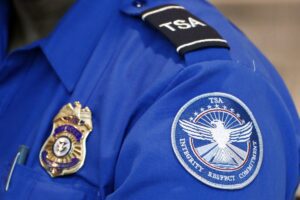Govt. Mulls Unified Airport Security
Context:
The Union government is considering creating a unified security force for all airports in the country, similar to the Transportation Security Administration (TSA) in the United States, which will also merge immigration and customs.
Points to Ponder:
- The Indian government is considering creating a unified security force for all airports in the country, integrating immigration and customs, similar to the Transportation Security Administration (TSA) in the United States.
- Prime Minister Narendra Modi has approved the proposal, which aims to create a unified security system for India’s rapidly expanding aviation business.
- Currently, the Central Industrial Security Force is in charge of security at 66 of India’s 148 airports, with state police in charge of the rest.
- Sea and land ports, as well as roads and highways, could be included in the proposed unitary agency. If the agreement is reached, legislative modifications will be required.
- The move is intended to unify policy, regulations, and implementation under one umbrella.
- According to the proposed single agency, it will also be entrusted with purchasing security infrastructure like X-ray machines and full body scanners.
- The Central Industrial Security Force (CISF) and the Bureau of Civil Aviation Security (BCAS) may merge as a result of the transfer.
- The Bureau of Immigration, which reports to the Union Home Ministry’s Intelligence Bureau, is in charge of immigration checks at airports, seaports, and land borders. However, once the TSA is operational, the immigration functions will also fall under its purview.
- The plan comes at a time when India is expected to be the world’s third-largest aviation market by 2024 and is presently the world’s third-largest domestic aviation market after the United States and China.
- Despite accounting for only 2% of global passenger traffic, India’s aviation market is the world’s fastest-growing at 9%.
- The overall number of airports in the country is also expected to increase from 148 to 220 by 2025, with carriers ordering more than 1,000 planes.
Transportation Security Administration (TSA)
- The Transportation Security Administration (TSA) is a United States government organisation that was established in the aftermath of the September 11, 2001, terrorist attacks to protect the safety of the country’s transportation infrastructure.
- The Aviation and Transportation Security Act, approved by Congress and signed into law by President George W. Bush on November 19, 2001, established the TSA.
- Originally part of the United States Department of Transportation, the TSA was absorbed into the newly formed Department of Homeland Security in 2003.
- The primary purpose of the TSA is to create and implement regulations that safeguard the safety of the nation’s transportation systems.
- The TSA’s most well-known job is airport security, which involves inspecting passengers and luggage for prohibited goods.
- Aside from airport security, the TSA maintains a public presence through VIPR teams that patrol railways and mass transit systems.
- The TSA is also in charge of ensuring the safety of freight carriers travelling on the country’s highways, cargo entering U.S. ports and travelling on U.S. waterways, and freight transferred by pipelines.
- To protect the safety of the country’s transport networks, the TSA employs a variety of professionals, including behaviour detection agents, federal air marshals, explosives specialists, and canine teams.
- Officers trained in behaviour detection observe passengers’ behaviour and body language to identify potential security risks.
- Federal air marshals are trained law enforcement agents who fly commercial planes undercover to protect passengers and crew.
- Explosives experts are trained to detect and defuse explosive devices. Canine teams are employed to detect bombs and other illegal substances.





